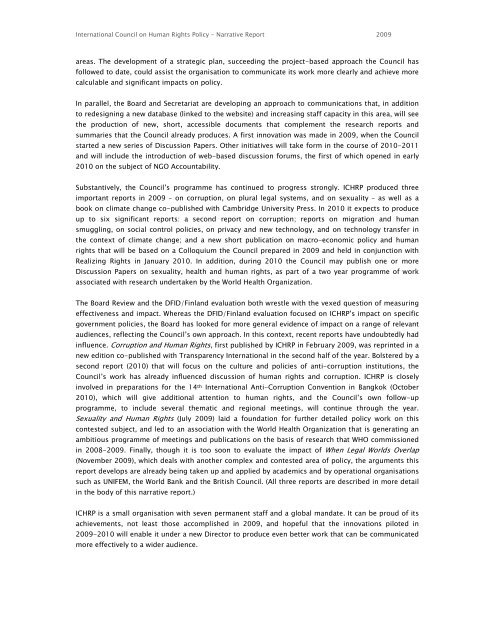NARRATIVE REPORT 2009 - The ICHRP
NARRATIVE REPORT 2009 - The ICHRP
NARRATIVE REPORT 2009 - The ICHRP
You also want an ePaper? Increase the reach of your titles
YUMPU automatically turns print PDFs into web optimized ePapers that Google loves.
International Council on Human Rights Policy - Narrative Report <strong>2009</strong><br />
areas. <strong>The</strong> development of a strategic plan, succeeding the project-based approach the Council has<br />
followed to date, could assist the organisation to communicate its work more clearly and achieve more<br />
calculable and significant impacts on policy.<br />
In parallel, the Board and Secretariat are developing an approach to communications that, in addition<br />
to redesigning a new database (linked to the website) and increasing staff capacity in this area, will see<br />
the production of new, short, accessible documents that complement the research reports and<br />
summaries that the Council already produces. A first innovation was made in <strong>2009</strong>, when the Council<br />
started a new series of Discussion Papers. Other initiatives will take form in the course of 2010-2011<br />
and will include the introduction of web-based discussion forums, the first of which opened in early<br />
2010 on the subject of NGO Accountability.<br />
Substantively, the Council’s programme has continued to progress strongly. <strong>ICHRP</strong> produced three<br />
important reports in <strong>2009</strong> – on corruption, on plural legal systems, and on sexuality – as well as a<br />
book on climate change co-published with Cambridge University Press. In 2010 it expects to produce<br />
up to six significant reports: a second report on corruption; reports on migration and human<br />
smuggling, on social control policies, on privacy and new technology, and on technology transfer in<br />
the context of climate change; and a new short publication on macro-economic policy and human<br />
rights that will be based on a Colloquium the Council prepared in <strong>2009</strong> and held in conjunction with<br />
Realizing Rights in January 2010. In addition, during 2010 the Council may publish one or more<br />
Discussion Papers on sexuality, health and human rights, as part of a two year programme of work<br />
associated with research undertaken by the World Health Organization.<br />
<strong>The</strong> Board Review and the DFID/Finland evaluation both wrestle with the vexed question of measuring<br />
effectiveness and impact. Whereas the DFID/Finland evaluation focused on <strong>ICHRP</strong>’s impact on specific<br />
government policies, the Board has looked for more general evidence of impact on a range of relevant<br />
audiences, reflecting the Council’s own approach. In this context, recent reports have undoubtedly had<br />
influence. Corruption and Human Rights, first published by <strong>ICHRP</strong> in February <strong>2009</strong>, was reprinted in a<br />
new edition co-published with Transparency International in the second half of the year. Bolstered by a<br />
second report (2010) that will focus on the culture and policies of anti-corruption institutions, the<br />
Council’s work has already influenced discussion of human rights and corruption. <strong>ICHRP</strong> is closely<br />
involved in preparations for the 14 th International Anti-Corruption Convention in Bangkok (October<br />
2010), which will give additional attention to human rights, and the Council’s own follow-up<br />
programme, to include several thematic and regional meetings, will continue through the year.<br />
Sexuality and Human Rights (July <strong>2009</strong>) laid a foundation for further detailed policy work on this<br />
contested subject, and led to an association with the World Health Organization that is generating an<br />
ambitious programme of meetings and publications on the basis of research that WHO commissioned<br />
in 2008-<strong>2009</strong>. Finally, though it is too soon to evaluate the impact of When Legal Worlds Overlap<br />
(November <strong>2009</strong>), which deals with another complex and contested area of policy, the arguments this<br />
report develops are already being taken up and applied by academics and by operational organisations<br />
such as UNIFEM, the World Bank and the British Council. (All three reports are described in more detail<br />
in the body of this narrative report.)<br />
<strong>ICHRP</strong> is a small organisation with seven permanent staff and a global mandate. It can be proud of its<br />
achievements, not least those accomplished in <strong>2009</strong>, and hopeful that the innovations piloted in<br />
<strong>2009</strong>-2010 will enable it under a new Director to produce even better work that can be communicated<br />
more effectively to a wider audience.
















